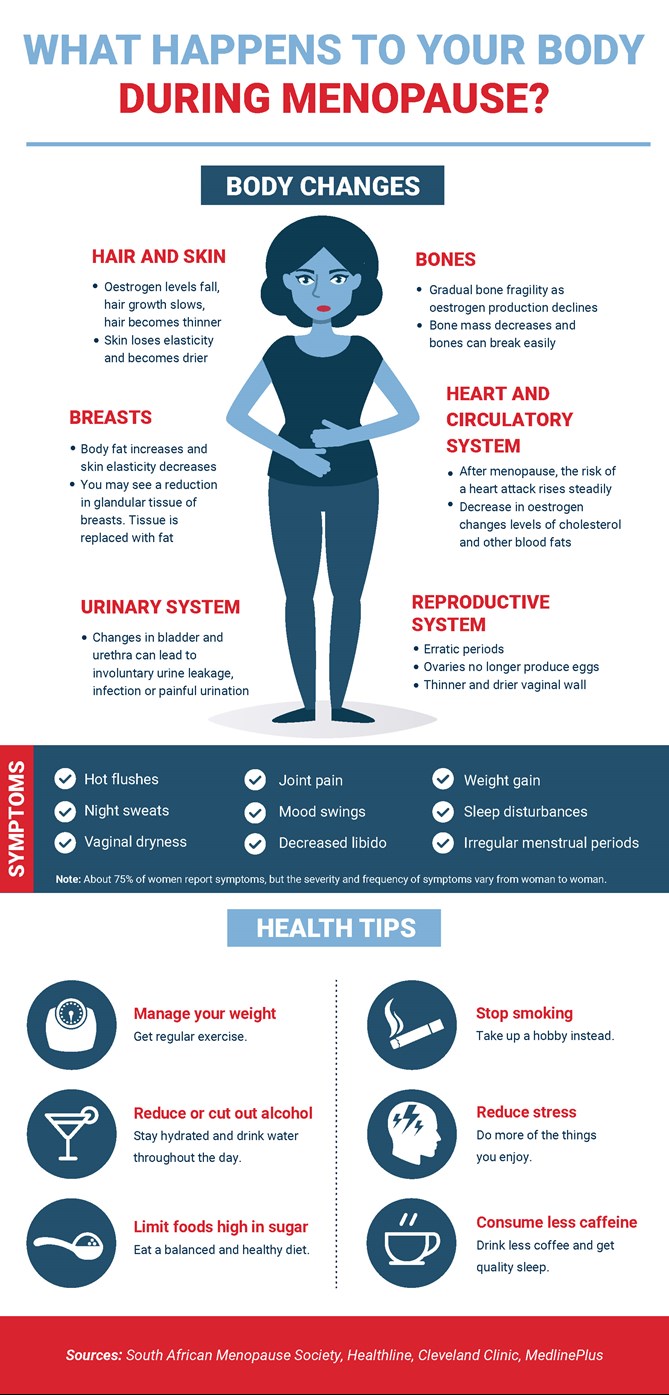Advice for managing menopause

For some women, experiencing menopause can also be a time of personal empowerment and positive energy. Life Healthcare experts weigh in on how best to manage this life stage.
What is menopause?
Menopause marks the end of fertility and menstrual cycles. It’s a change in a woman’s body that usually occurs between the ages of 45 and 55, and the first obvious sign is your menstrual cycle, says Life Beacon Bay Hospital obstetrician and gynaecologist Dr Robyn Spring.
‘Sometimes your periods may be longer than usual or the interval between periods may be shorter, or a combination of the two. Headaches are also common, but these are much easier to manage than some of the other symptoms,’ she says.
Hot flushes and night sweats are also fairly common, but Dr Spring says wearing light cotton clothing or nightwear that is easy to layer up or down and exercising regularly, for example cycling, can help to deal with these physiological symptoms.


Menopause symptoms
While there is a wide range of symptoms, Dr Spring outlines a few of the most common:
Physiological
- Headaches: the vascular system is less stable than normal, so many women experience migraines and tension headaches.
- Urinary tract and reproductive organs: vaginal dryness and urinary problems are a result of oestrogen levels being less available, making the walls of the bladder, urethra and vagina drier and less flexible.
- Weight gain: gaining weight is common, as your metabolism becomes slower with age. This symptom is best managed with regular exercise.
Psychological
- Mood swings: during the onset of menopause, oestrogen and progesterone levels decline, which leads to some women feeling more ‘emotional’, which could lead to anger, sadness, irritability or depression.
- Low sex drive: women experience decreased libido, but for many it tends to be a temporary symptom.
- Memory and cognitive changes: this symptom can be one that is very distressing for women, but it should be noted that some memory loss is normal with ageing.
Diseases linked to menopause
Dr Spring says women going through menopause are at risk of hypertension, diabetes and sometimes osteoporosis (decrease in bone-mineral density). ‘Osteoporosis is a major underlying cause of fractures in postmenopausal women and the elderly,’ explains Dr Spring.
Other diseases include cardiovascular ageing caused by elevated LDL cholesterol (the ‘bad’ kind) levels; atherosclerosis, which is the narrowing of arteries due to plaque build-up; and arterial calcification, where calcium deposits thicken and harden arteries. ‘Also, the age-related development of hypertension exacerbates cardiovascular risks, and osteoarthritis and joint pain may be linked to low oestrogen levels,’ she says.
‘Body composition also changes, as there’s a loss of muscle tissue, which is sometimes replaced with fat. There are changes to the skin, such as sagging, wrinkles and fragility, due to a decline in collagen production.’
Hormone replacement therapy
Commonly known as HRT, hormone replacement therapy can be helpful, as it restores what the body is losing. HRT in the form of tablets, patches or gels reduces menopause symptoms by boosting the body with more female sex hormones. While HRT may slightly reduce the risk of bowel cancer and some other diseases, there are risks and every woman’s body is different. HRT should be discussed with your gynaecologist, who will also do a risk assessment.</>
Menopause and cancer
The evidence that HRT can cause some types of cancer (breast, womb and ovarian) is strong. A study by Cancer Research UK scientists shows that a million women using HRT are at risk of some form of cancer. But it’s important to remember that the increased cancer risk with HRT is small compared to many other risk factors, such as smoking or being overweight.
FAQs about menopause
Q: Can I go through menopause before 50?
A: Yes, it’s called perimenopause, and it can start several years before. Perimenopause can start in your 40s, but even as early as your 30s. During this transition to menopause, you will still have a period, though it might be irregular. Some other symptoms are heart palpitations, disrupted sleep, loss of bone density and decreased libido, but it’s best to have a doctor confirm the diagnosis.
Q: Can I still get pregnant?
A: Although your chances decline as you get older, it’s still possible to conceive during the perimenopausal stage. It is advised that women who are practising birth control do so until at least one year after their final menstruation.
Q: What treatment options do I have?
A: Perimenopause is a natural process, so it’s not necessary to treat the symptoms unless they are affecting your life, which can be the case with heavy periods, but your doctor can advise you on what is best based on your individual health profile.
The information is shared on condition that readers will make their own determination, including seeking advice from a healthcare professional. E&OE. Life Healthcare Group Ltd does not accept any responsibility for any loss or damage suffered by the reader as a result of the information provided.

